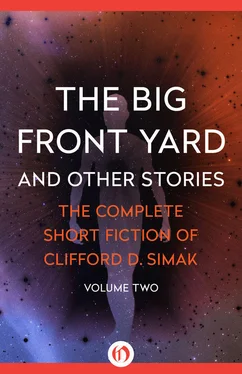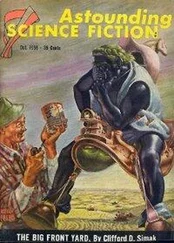He searched inside himself, inside the theoretical intelligence enclosed within the hypothetical force field, for the purpose that was hinted in that single word. When he found it, it stood out sharp and clear – the one thing he had found that was sharp and clear. What was here that could be used and what would be the cost of obtaining it? A treasure hunt, he thought. That was the purpose of him. It was clear immediately that he, himself, had no use for treasure of any kind at all. There must be someone else who would have a use for it. Although when he thought of treasure a pleasurable thrill went through him.
What might there be in it for him, he wondered, this location of a treasure? What had been the profit to him in the finding of all those other treasures on all those other planets – although, come to think of it, there had not been treasure on every one of them. And on some of the others where there’d been, it had been meaningless, for planetary conditions had been such that it could not be got at. Many of the planets, he recalled, far too many of them, were such that only a thing such as himself would dare even to approach them.
There had been attempts, he remembered now, to recall him from some of the planets when it had become apparent they had no economic worth and that to further explore them would be a waste of time. He had resisted those attempts; he had ignored the summons to return to wherever it was he went when he did return. Because, in his simplistic ethic, when there was a job to do he did it and he did not quit until the job was done. Having started something, he was incapable of leaving off until it had been finished. It was a part of him, this single-minded stubbornness; it was a characteristic that was necessary to do the work he did.
If they had it one way, they could not have it two. He either was, or wasn’t. He did the job, or didn’t. He was so made that he had an interest in each problem that was presented him and would not leave off until he’d wrung the problem dry. They had to go along with that and they knew it now; they no longer bothered trying to recall him from a non-productive planet.
They? he asked himself, and remembered faintly other creatures such as he had been. They had indoctrinated him, they had made him what he was and they used him as they used the priceless planets he had found, but he did not mind the using, for it was a life and the only life he had. It either had been this life, or no life at all. He tried to recall circumstances, but something moved to block the recall. Exactly as he never could recall in all entirety, but only in fragments, the other planets he had visited. That, he thought at the time, might be a great mistake, for experience he had gathered on the other planets might have been valuable as guide lines on the one to which he currently had been sent. But for some reason, they did not allow it, but did their imperfect best to wipe from his memory all past experiences before he was sent out again. To keep him clear, they said; to guard him from confusion; to send a bright new mind, freed of all encumbrances, out to each new planet. That was why, he knew, he always arrived upon each planet groping for a meaning and purpose, with the feeling of being newly born to this particular planet and to nowhere else.
He did not mind. It still was a life and he saw a lot of places – very different places – and saw them, no matter what conditions might obtain, in perfect safety. For there was nothing that could touch him – tooth, or claw, or poison, no matter what the atmosphere, no matter what the radiation, there was nothing that could touch him. There was nothing of him to be touched. He walked – no, not walked, but moved – in utter nonchalance through all the hells the galaxy could muster.
A second sun was rising, a great swollen, brick-red star pushing its way above the horizon, with the first one just beginning to slide towards the west – as a matter of convenience, he thought of the big red one as rising in the east.
K2, he read it, thirty times, or so, the diameter of the Sun with a surface temperature that was possibly no more than 4,000 degrees. A binary system and maybe more than that; there might be other suns that he still had yet to see. He tried to calculate the distance, but that would not be possible with any accuracy until the giant had moved higher in the sky, until it had moved above the horizon that now bisected it.
But the second sun could wait, all the rest of it could wait. There was one thing he must see. He had not realized it before, but now he knew there was one thing about the landscape that had been nagging him. The crater did not fit. It had all the appearances of a crater, but it had no right to be there. It could not be volcanic, for it sat in the middle of a sandy terrain and the limestone thrusting from the hillside was sedimentary rock. There was no trace of igneous rock, no ancient lava flows. And the same objections still would hold if the crater had been formed by meteoric impact, for any meteorite that threw up a crater of that size would have turned tons of material into a molten mass and would have thrown out a sheet of magma, of which there was no sign.
He began drifting slowly in the direction of the crater. Beneath him the terrain remained unchanged – the red soil, the purple fruit and little else.
He came to rest – if that is what his action could be called – on the crater’s rim and for a moment failed to understand what he was seeing.
Some sort of shining substance extended all around the rim and sloped inward to the center to form what appeared to be a concave mirror. But it was not a mirror, for it was nonreflective.
Then, quite suddenly, an image formed upon it and if he could have caught his breath, he would have.
Two creatures, one large, the other smaller, stood on a ledge above a deep cut in the earth, with a striated sandstone bluff rising up above them. The smaller one was digging in the bluff with a hand tool of some sort – a hand tool that was grasped in what must be a hand, which was attached to an arm and the arm hooked up to a body, which had a head and eyes.
Myself, he thought – the smaller one, myself.
He felt a weakness and a haziness and the image in the mirror seemed to be trying to pull him down to join and coalesce with this image of himself. The gates of memory opened and the old, restricted data came pouring in upon him – the terms and relationships – and he cried out against it and tried to push it back, but it would not push back. It was as if someone were holding him so he could not get away and, with a mouth close against his ear, was telling him things he did not wish to know.
Humans, father, son, a railroad cut, the Earth, the finding of that first trilobite. Relentlessly the information came pouring into him, into the intellectual force field that he had become, that he had evolved into, or been engineered into, and that had been a comfort and a refuge until this very moment.
His father wore an old sweater, with holes in the elbows of the sleeves, and an old pair of black trousers that were baggy at the knees. He smoked an ancient pipe with a fire-charred bowl and a stem half-bitten through, and he watched with deep paternal interest as the boy, working carefully, dug out the tiny slab of stone that bore the imprint of an ancient form of life.
Then the image flickered and went out and he sat (?) upon the crater’s rim, with the dead mirror sweeping downward to its center, showing nothing but the red and blue reflections of the suns.
Now he knew, he thought. He knew, not what he was, but what he once had been – a creature that had walked upon two legs, that had a body and two arms, a head and eyes and a mouth that cried out in excited triumph at the finding of a trilobite. A creature that walked proudly and with misplaced confidence, for it had none of the immunity against its environment such as he now possessed.
Читать дальше












